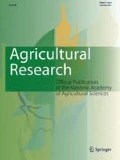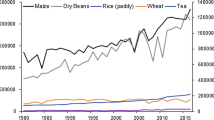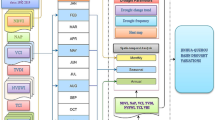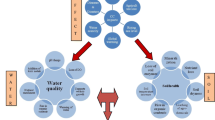Abstract
The long period meteorological data of maximum temperature, minimum temperature and rainfall of Pusa, Purnia, Sabour and Patna stations representing different agro-ecological zone of middle Indo-Gangetic plain for the period (44–58 years) were analysed for trend analysis of temperature and rainfall for rabi season and heat waves, cold waves and extreme rainfall events for the whole year. The Theil–Sen’s slope and Mann–Kendall test were used to investigate the trends in climate variability (maximum and minimum temperature, rainfall) and extreme weather events (heat waves, cold waves and extreme rainfall). The maximum temperature had significant decreasing trend in Rabi season at Sabour. The minimum temperature had a significant increasing trend at all the stations in Rabi season. At Pusa, rainfall had a significant decreasing trend. Significant decreasing trend in heat waves at Pusa and Sabour stations were found. In this study, an attempt was made to assess the impact of these parameters on the productivity of wheat crop in Bihar. For this purpose, CROPSIM-Wheat model 4.6 was used to assess the change in wheat yield under different climate change scenarios for four locations viz. Pusa (zone I), Purnia (zone II), Sabour (zone III A) and Patna (zone III B) in Bihar. The model was run for the scenarios like increase in maximum temperature and minimum temperature with 1 °C, 2 °C and 3 °C separately and 1 °C, 2 °C, 3 °C, 4 °C increase in mean temperature keeping all parameters normal on wheat yield. Simulated wheat productivity revealed the reduction in grain yield by 7.4–10.4%, 15.3–21.2%, 21.6–30.9% and 26.9–38.6% in response to temperature rise by 1 °C, 2 °C, 3 °C and 4 °C, respectively, from baseline yield (1980–2010) at different locations. Warming temperature and greater incidence and intensity of extreme weather events due to climate change may significantly affect crop yield.
Similar content being viewed by others
References
De US, Dubey RK, Prakassa Rao GS (2005) Extreme weather events over India in the last 100 years. J Ind Geophys Union 9(3):173–187
Gahukar RT (2009) Food security: the challenges of climate change and bio-energy. Curr Sci 96:26–28
Hays DB, Mason RE, Do JH (2007) Developments in plant breeding II. In: Buck HT, Nisi JE, Salomón N (eds) Wheat production in stressed environment. Springer, Dordrecht
Hirsch RM, Slack JR, Smith RA (1982) Techniques of trend analysis for monthly water quality data. Water Resour Res 18:107–121
Horie T, Bhaskar JT, Nkagawa H (2000) Crop ecosystem responses to climate change: rice. In: Reddy KR, Hodges HF (eds) Climate change and global crop productivity. CABI Publishing, Walingford Oxon, pp 81–106
IPCC (2014) Climate Change 2014: synthesis report. Contribution of working groups I, II and III to the fifth assessment report of the intergovernmental panel on climate change [Core Writing Team, Pachauri RK, Meyer LA (eds)]. IPCC, Geneva, Switzerland, pp 151
Karl TR, Jones PD, Knight RW, Kukla G, Plummer V, Raxuvayev KP, Gallo JL, Charleston RJ, Peterson TC (1993) Asymmetric trends of daily maximum and minimum temperature. Bull Am Meteorl Soc 74(6):1007–1023
Pandey V, Patel HR, Patel VJ (2007) Impact assessment of climate change on wheat yield in Gujarat using CERES-wheat model. J Agrometeorol 9(2):149–157
Patel HR, Patel VJ, Pandey V (2008) Impact assessment of climate change on maize cultivars in middle Gujarat agro-climatic region using CERES maize model. J Agrometeorol (special issue-Part 2):292–295
Patil KS, Durge DV, Shivankar RS (2003) Effect of temperature on yield and yield components of late sowing wheat. J Appl Sci Res 6:177–183
Rajeevan M, Yadav BP (2015) Revised terms and terminologies in weather forecasting services. Forecasting Circular No. 5/2015 (3.7) IMD: 4–6
Sairam RK, Srivastava GC, Saxena DC (2000) Increased antioxidant activity under elevated temperatures: a mechanism of heat stress tolerance in wheat genotypes. Biol Plant 43:245–251
Solomon S, Qin D, Manning M, Chen Z, Marquis M, Averyt KB, Tignor M, Miller HL (2007) Contribution of working group I to the fourth assessment report of the intergovernmental panel on climate change. Cambridge University Press, Cambridge, New York
Van Oijen M, Ewert F (1999) The effects of climatic variation in Europe on the yield response of spring wheat cv ‘Minaret’ to elevated CO2 and O3: an analysis of open-top chamber experiments by means of two crop growth simulation models. Eur J Agron 10:249–264
Acknowledgements
The author is thankful to Bihar agricultural University, Sabour for providing platform for the research. The author is also thankful to the India Meteorological Department, Pune, for providing weather data. BAU Communication No. 144/2016.
Author information
Authors and Affiliations
Corresponding author
Rights and permissions
About this article
Cite this article
Kumar, S. Impact of Extreme Weather Events on Wheat Yield in Different Agro-Ecological Zones of Middle Indo-Gangetic Plain. Agric Res 8, 247–251 (2019). https://doi.org/10.1007/s40003-018-0372-0
Received:
Accepted:
Published:
Issue Date:
DOI: https://doi.org/10.1007/s40003-018-0372-0




